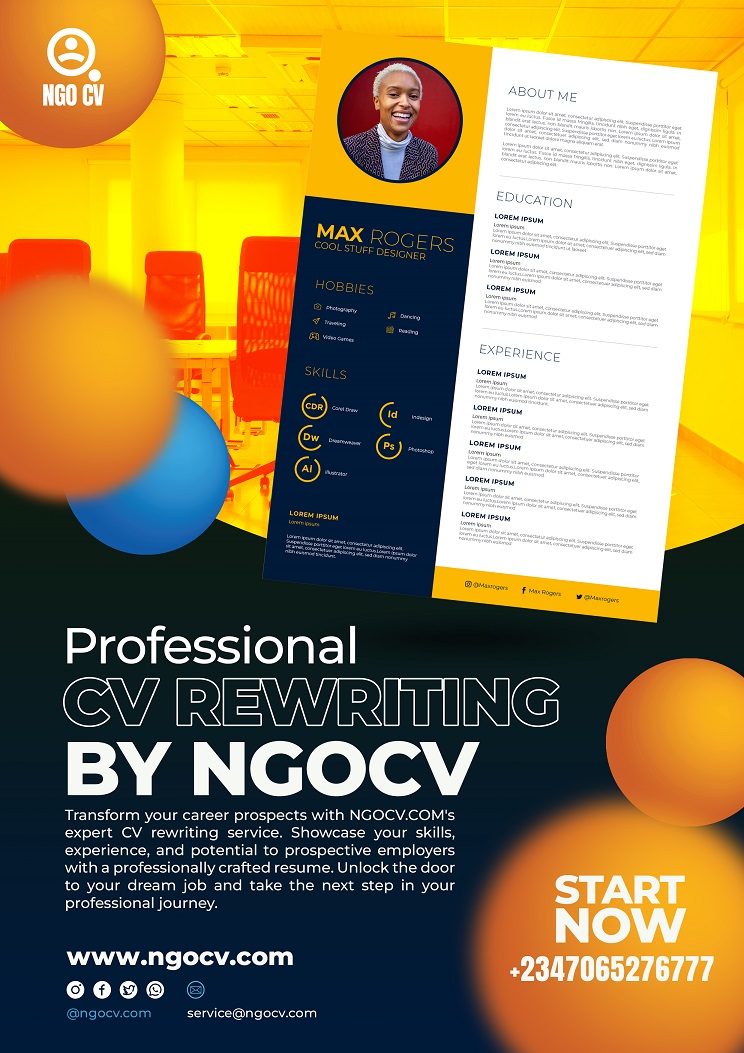
Baseline Assessment for Multi-Sectoral Approach Project targeted at Protection of Women and Girls from Gender-Based Violence in Education Facilities across 6 LGAS of Borno, NE Nigeria
Location: Gwoza, Jere, Konduga Magumeri, Mobbar and Ngala, LGAs of Borno
Duration: 60 working days, between April 15, 2024, and June 14, 2024
Related Programme Area: Education and Protection Sector
Duty station: Maiduguri, Borno State
Supervision and reporting: Executive Director of CATAI, NHF Consortium Manager and M&E Manager
1. Background
Borno, located in Northeast Nigeria, is a region that has been deeply affected by ongoing armed conflict. This conflict has led to a humanitarian crisis, with over eight million people, primarily women and children, requiring assistance.1 An estimated 600,000 individuals are facing emergency levels of food insecurity due to extremist violence in the Lake Chad region.2 Women and girls in Borno are confronted with significant challenges, including gender-based violence (GBV) in education facilities. The crisis, caused by the Boko Haram insurgency in northeast Nigeria, has resulted in over 2,295 teachers being killed and 19,000 displaced since 2009. Over 57% of schools in Borno, the state most affected, are closed.3
GBV is a widespread issue that impacts many girls and women globally. Factors such as poverty, early marriage, and discriminatory practices often hinder girls and women from exercising their right to education4. In Borno, these issues are intensified by the ongoing conflict and displacement. In addition to the violence, girls and women also face challenges related to access to education and health care. It is estimated that 110 million girls and young women may remain out of school by 2030. This lack of access to education further exacerbates the issues faced by women and girls in Borno.
Against this backdrop, the Center for Advocacy, Transparency, and Accountability Initiative (CATAI) with support from the Nigeria Humanitarian Fund (NHF) is leading a consortium project to expand access to GBV and child protection programs in schools and other learning environments with a focus to collectively prioritize the protection of women and girls. This consortium includes Unique Care and Support Foundation (CASFOD) and Future Resilience and Development (FRAD) Foundation as implementing partners.
The project has two main sectors of focus: education and protection. In the education sector, the project aims to increase the enrolment of vulnerable girls and women affected by the conflict in schools and other learning setups across the 6 LGAs of Borno State. It also aims to increase the transition rate of targeted girls
and women from non-formal to formal education as evidenced by their performance in state examination and successful mainstreaming. In the protection sector, the project aims to improve access to protection, rights, and inclusive access to services that support the wellbeing of children and their caregivers in emergencies. It aims to increase the utilization of protection services by children, women, and girls affected by emergencies, measured through comprehensive assessments and assessments, as compared to the baseline data. It also aims to increase the number of children and women who report improved wellbeing as compared to baseline data.
Under the consortium, CATAI and its partners intends provide an innovative approach from the old normal in the thematic sector of protection and education, putting in mind multi-sectoral activities in WASH and GBV to ensure access to services that increase protective factors of women and girls. The multi-sector approach for the project is proposed to reach 9,353 persons directly, including persons living with disabilities, in six local government areas (LGAs) of Borno State, namely Gwoza, Jere, Konduga Magumeri, Mobbar and Ngala.
2. Purpose of the Baseline Assessment
The baseline assessment is being conducted to establish a benchmark for measuring the project’s impact in the education and protection sectors, specifically focusing on the protective factors for women and girls. It serves the following purposes:
- Establish a Benchmark: The assessment will establish a benchmark or a ‘baseline’ against which future changes can be measured. This includes the current state of education and protection sectors, the enrolment rates of vulnerable girls and women, their transition rates from non-formal to formal education, the utilization of protection services, and wellbeing reports.
- Identify Needs and Priorities: The assessment will help identify the needs and priorities of the target population. This information will guide the project implementation and ensure that the interventions are tailored to the needs of the beneficiaries.
- Inform Project Design: The findings from the baseline assessment will inform the project design and implementation. It will help in setting realistic targets and ensuring that the project interventions are relevant and effective.
The baseline assessment aims to achieve the following:
- Data Collection: Collect comprehensive and reliable data on the current situation in the education and protection sectors. This includes data on enrolment rates, transition rates, utilization of protection services, and wellbeing reports.
- Benchmarking: Establish a benchmark against which the project’s progress and impact can be measured. This will enable the project team to track changes over time and assess the effectiveness of the interventions.
- Inform Decision-Making: Provide valuable information that will inform decision-making throughout the project lifecycle. The findings from the baseline assessment will guide the project implementation, monitoring, and evaluation.
- Stakeholder Engagement: Engage with stakeholders, including beneficiaries, project staff, and partners. The process of conducting the baseline assessment will provide an opportunity for stakeholder engagement, which is crucial for the project’s success.
3. Scope of Work
The baseline assessment will cover the following specific tasks:
Education Sector:
- Enrollment Assessment: Conduct an assessment to determine the current enrollment rates of vulnerable girls and women affected by the conflict in schools and other learning setups in the 6 LGAs.
- Transition Rate Analysis: Analyze the transition rates of targeted girls and women from nonformal to formal education. This includes assessing their performance in state examinations and successful mainstreaming.
- Education Quality Evaluation: Evaluate the quality of both formal and non-formal education provided to the target population. This includes assessing the curriculum, teaching methods, and learning materials.
- Capacity Assessment: Assess the training and capacity-building programs for teachers and other teaching staff. This includes evaluating the effectiveness of these programs in improving the quality of education.
Protection Sector:
- Protection Services Utilization Assessment: Conduct an assessment to determine the current utilization of protection services by children, women, and girls affected by emergencies.
- Wellbeing Report Analysis: Analyze wellbeing reports to understand the current state of wellbeing of the target population. This includes assessing physical, emotional, and social wellbeing.
- Protection Mechanisms Evaluation: Evaluate the existing protection mechanisms and their effectiveness in protecting the rights and wellbeing of the target population.
- Capacity Assessment: Assess the capacities of government agencies, national NGOs, and CBOs to promote women leadership and take ownership for the protection of women and girls.
Innovation Outcome:
1. Leadership Assessment: Conduct an assessment to determine the current level of women and girls’ leadership in local humanitarian interventions.
4. Key Deliverables
The specific outputs expected from the baseline assessment include:
- Baseline Assessment Report: A comprehensive report detailing the findings of the baseline assessment. This report should include an executive summary, methodology, findings, conclusions, and recommendations. The report should present the status in the education and protection sectors, including data on enrolment rates, transition rates, utilization of protection services, and wellbeing reports.
- Data Sets: Complete data sets of all the information collected during the assessment. This includes raw assessment data, interviews, focus group discussions, and case studies. The data sets should be organized and formatted in a way that allows for easy analysis and interpretation.
- Analysis and Interpretation: Detailed analysis and interpretation of the data collected. This includes statistical analysis of quantitative data and thematic analysis of qualitative data. The analysis should identify trends, patterns, and key insights.
- Recommendations: Based on the findings of the baseline assessment, the organization should provide specific, actionable recommendations for project implementation. These recommendations should aim to address the identified needs and priorities, improve the effectiveness of the interventions, and enhance the protective factors for women and girls.
- Benchmark Indicators: The baseline assessment should establish benchmark indicators against which the project’s progress and impact can be measured. These indicators should be specific, measurable, achievable, relevant, and time-bound (SMART).
- Presentation: A presentation summarizing the key findings and recommendations of the baseline assessment. This presentation can be used to communicate the results of the assessment to stakeholders, including project staff, partners, and beneficiaries.
5. Timeline/Duration
The duration of this assignment shall be for a total duration of 60 working days, from approximately April 15 2024 and June 14, 2024. The timely planning, communication, preparation and execution of the assignment is of utmost importance for CATAI.
| Task | Deliverables | Person days | Deadline |
| Project Kick-off | Kick-off Meeting | 2 | April 16, 2024 |
| Development of Assessment Tools | Assessment Questionnaires, Interview Guides | 10 | April 26, 2024 |
| Training of Assessment Team | Training Report | 5 | May 1, 2024 |
| Data Collection | Raw Data | 15 | May 16, 2024 |
| Data Cleaning and Analysis | Cleaned Data Set, Preliminary Analysis | 10 | May 26, 2024 |
| Report Writing | Draft Report | 10 | June 5, 2024 |
| Review and Feedback | Revised Draft Report | 4 | June 10, 2024 |
| Validation workshop with target stakeholders | Report | 1 | June 12, 2024 |
| Final Report Writing | Final Report | 3 | June 13, 2024 |
| Total days | 60 |
6. Commencement of the Work
After signing the Contract, the Consultant will meet with the Executive Director, Consortium Manager and the MEAL Coordinator to discuss all technical and non-technical matters for the project. At the meeting, the workplan will be presented for discussion and, if necessary, will be revised accordingly.
7. Project Management
Supervision: Direct supervision is provided by the ED of CATAI, the Consortium Manager, and the M&E Manager.
Reporting: The Consultant will be expected to provide CATAI with project updates, documents, work plans, or other documentation as requested and will report to the CATAI every week. Depending on the situation and urgency, daily updates and reporting may be required. Performance progress reports must be provided at every stage of contract payment.
Support from CATAI: Discussions on contract work assignments and deliverables will be provided by the contract supervisor. The contract supervisors will be available, as/when required, to provide comments on submitted outputs promptly. The education and child protection officers will also work closely with the Consultant daily and provide support for accessing and meeting people within CATAI Maiduguri.
Quality Control: The Consultant’s performance will be evaluated by the ED, Consortium Manager, and MEAL Coordinator CATAI, Maiduguri. Any deviations from the initial planning and assignments shall be promptly considered and solved; any conditions beyond the responsibility of the Contractor shall be brought to the attention of CATAI’s Representative.
Travel and work arrangements: The consultant will travel to the 6 target LGAs of Borno.
Office, tools and equipment: The Consultant shall use his/her own computer and office space.
8. Minimum Qualification Requirements
- Master’s degree or higher in development, international relations or humanitarian work.
- Extensive experience in conducting evaluations along OECD evaluation criteria, ideally leading an evaluation team, and experience in designing evaluation methodology/tools and data analysis.
- A minimum of 5 years of progressively responsible work experience in research and or evaluations of health and humanitarian assistance programs
- Experience of working or evaluating projects in an insecure humanitarian environment.
- In-depth knowledge of quantitative and qualitative research methods
- Experience in quantitative and/or qualitative methodologies, using different research techniques, statistical techniques software packages, and computer-based programs;
- Proven track record on successful delivery of high-quality reports and recommendations;
- Excellent analytical, presentation, and writing skills in English
CATAI reserves the right to withhold up to 30% of the total fee in case of deliverables are not submitted according to the schedule or do not meet the required standard. Copyright and ownership of all documents produced will remain with CATAI.
9. Expression of Interest
The CATAI welcomes expressions of interest from seasoned consultants, individuals or firms in academia, social research, or humanitarian evaluation with a background in humanitarian aid, research methods, development economics, development studies, or other related fields.
Technical proposal with clear understanding and interpretation of the ToR, including detailed tasks, recommended methodology summary and proposed schedule, relevant experience, how you meet the profile required, and details of time required (maximum 5 pages)
Financial proposal, including daily professional fee and any other associated costs for the assignment. The consultant should itemize all costs for the duration of the assignment, lumped-up costs will not be accepted in the financial proposal. CATAI will only cover field-related costs while in-country. All costs need to be clearly stated in the bid submission.
CVs of prospective consultants.
Samples of previous successful previous similar assignments
All applications should be submitted to:
Note: Applications lacking any of the above requirements will not be considered.




